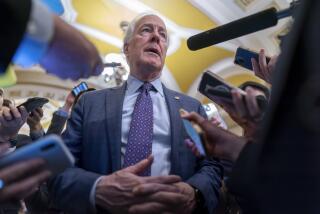Colorado’s Campbell Won’t Seek a Third Term in Senate
WASHINGTON — Republican Sen. Ben Nighthorse Campbell of Colorado, who has been battling health problems and an ethics scandal involving his Senate staff, said Wednesday that he had canceled his plans to seek a third term in November.
Campbell, 70, had been engaged in a vigorous reelection bid while recovering from prostate cancer. But after checking into the hospital for the second time in a week with chest pains and other health concerns, he announced he would not run.
“I am honored to have represented the people of Colorado ... and I know that there is no greater job than to serve my fellow citizens in the U.S. Senate, but I feel the time has come to pass that duty on to another and return to my ranch with my family that I love,” Campbell said in statement. “After spending another night in the hospital, I realize that deteriorating health may hamper my ability to serve.”
Democrats, delighted that Campbell -- who switched parties in 1995 -- would not seek reelection, said the evolving scandal drove him from the race.
Campbell, who was born in California but adopted Colorado as his home state, has been a distinctive figure on Capitol Hill with his gray ponytail, motorcycles and Western-cut suits. The only Native American serving in the Senate -- his father was a Northern Cheyenne and his mother a Portuguese immigrant -- he made a name for himself not only in politics but also as an Olympic judo athlete, jewelry designer and horse trainer.
Campbell was first elected to the Colorado Legislature in 1982, and later represented the state in the House of Representatives. He joined the U.S. Senate in 1992 as a Democrat, switched parties three years later, and was reelected as a Republican in 1998.
Campbell’s decision to drop out of the race brings to three the number of Republican senators who have decided not to seek reelection. Five Democrats have taken the same course. There are 51 Republicans in the Senate, 48 Democrats and one independent.
For Democrats, Campbell’s announcement Wednesday means that instead of having to go against a popular incumbent, they can vie for an open seat in a state that swings between Republicans and Democrats.
“It’s huge,” said Chris Gates, chairman of the Colorado state Democratic Party. “A political tsunami has washed over the Colorado political scene today.”
Gates called Campbell’s statement about his reasons for retiring “disingenuous.”
Campbell’s chief of staff, Ginnie Kontnik, resigned two weeks ago after the Denver Post disclosed that she admitted orchestrating a kickback. She told the newspaper that she inflated an aide’s salary and that the aide then returned $2,000 in cash. She said the senator had given his approval.
Campbell referred the allegation to the Senate Ethics Committee, and the Justice Department reportedly was also considering an investigation.
Republicans played down the role that the ethics questions played in Campbell’s decision.
Cinamon Watson, Campbell’s reelection spokeswoman, said the controversy played no role in the senator’s decision. “Democrats are just playing partisan politics,” she said.
Colorado Republican Party Chairman Ted Halaby said that “everything I know is that this decision is based solely on Campbell’s health issues.... I won’t speculate on anything else.”
After Campbell’s announcement, names mentioned as possible contenders on the Democratic side included Rep. Mark Udall and former presidential candidate and Sen. Gary Hart.
On the Republican side, Colorado Gov. Bill Owens topped the list of possible contenders. “There is no denying his popularity in the state,” Halaby said of Owens, a conservative Republican who was reelected for his second term in 2002. “He has an impeccable record of integrity.”
Kristen Hubbell, a spokeswoman for Owens, said he was digesting the news and hadn’t made any plans.
Senate Majority Leader Bill Frist (R-Tenn.) said of Campbell: “The Senate will miss his plain-spoken humor, his keen perspective and his uncommon drive to improve the daily lives of everyday Americans.
“Ben, after all, is an American original. His unique personal history -- serving in the Air Force in Korea, captain of the 1964 U.S. Olympic Judo team, rancher, jewelry designer, horse trainer and public official -- helped provide the Senate valuable insight on any number of fronts.”
Campbell’s voting record has been near the middle of the Senate on economic and cultural issues, but after he switched parties he changed positions on a number of issues -- from drilling in the Arctic National Wildlife Refuge to the assault weapons ban -- to align with Republicans.
Shogren reported from Washington, Kelly from Colorado.
More to Read
Get the L.A. Times Politics newsletter
Deeply reported insights into legislation, politics and policy from Sacramento, Washington and beyond. In your inbox three times per week.
You may occasionally receive promotional content from the Los Angeles Times.










